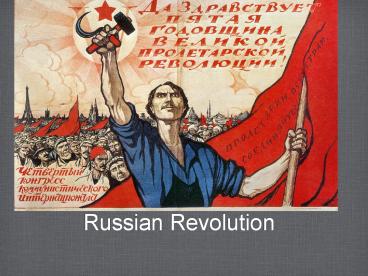Russian Revolution - PowerPoint PPT Presentation
Title:
Russian Revolution
Description:
Russian Revolution Overarching Unit Question: How does a society evolve and change? Essential Questions: What are the characteristics of capitalism, socialism and ... – PowerPoint PPT presentation
Number of Views:349
Avg rating:3.0/5.0
Title: Russian Revolution
1
Russian Revolution
2
Overarching Unit Question
- How does a society evolve and change?
- Essential Questions
- What are the characteristics of capitalism,
socialism and communism and how did each system
emerge in different regions? - To what extent can revolutions be viewed as a
process? - One - sneak peak at the Russian Revolution
3
Russian Revolution Stage 1
- 1. Weak leadership
- 2. Class conflict
- 3. Intellectuals speak out
- 4. Weak economy
4
1. Weak Leadership
Alexander III (I845-1894)
Nicholas II (1868-1918)
5
1. Weak LeadershipHarsh Rule by the Czars
- Alexander III (I845-1894)
- Imposed harsh measures
- Censored publications
- Russification uniform culture
- Pogroms persecutions of the Jews
- Nicholas II (1868-1918)
- Continued harsh policies
- Boosted growth in heavy industry
- Began work on Trans-Siberian Railway
6
2. CLass Conflict
- From 1890s-1900 - huge push to industrialize
- Trans-Siberian Railway - 5,800 miles long
- Growth of factories led to same issues seen in
British Industrial Revolution with working and
living conditions
7
2. Class Conflict
- Bloody Sunday The Revolution of 1905
- January 22, 1905 - protest over wages, working
conditions - 500 - 1000 unarmed workers, wives, and kids killed
8
3.Intellectuals speak out
- Intellectuals in Russia began to turn to Karl
Marx - Russian Marxists split into two groups
- Mensheviks - broad popular support
- Bolsheviks - small group for radical change
- Leader Lenin
9
4. Economic/Political Weakness
- 1. Russo-Japanese War (1904)
- Russian troops are defeated on land and sea by
tiny Japan? - Why does it matter?
10
4. Economic/Political Weakness
- World War I (1914-1917)
- Unprepared
- massive casualties
- low morale
- hunger
- Rasputin
11
Stage 2
- 1. Financial Breakdown
- 2. Dramatic/Symbolic events
- 3. Government cannot repress rebellion
- 4. Moderate government gains control
12
2. Dramatic Events
- The March Revolution
- March 1917 - Women textile workers strike in
Petrograd, which led to riots over bread
13
3. Government cannot repress rebellionMutiny in
Petrograd and Revolutionary sailors in
Kronshtadt
- Czars soldiers join in with rioters during the
March Revolution - Nicholas forced to abdicate
- What happened to the Czar and his family?
14
4. Moderate Government gains control
- Provisional government headed by Alexander
Kerensky wants a constitutional monarchy - Re-established Duma (Russian parliament)
15
Stage 3
- 1. Radicals take control
- 2. Civil/Foreign war
- 3. Strong man
- 4. Terror and Virtue
16
1. Radicals take control
- Lenin returns to Russia
- November 1917 - Bolshevik Red Guards took over
Provisional government - Lenin distributed all farmland among peasants and
gave factories to workers - Treaty of Brest-Litovsk to end WWI in Russia
17
2. Civil War
- Mensheviks formed the White Army
- Trotsky commanded Bolshevik Red Army
- 3 years, 15 million deaths, and famine
- Red Bolshevik Army won
18
3. Strong man
Lenin (1879-1924)
Influences on Lenin's early life
19
4. Terror and VirtueAugust 1918 - Fear and
Paranoia
- Terror -gt Lenin arrested those who were not in
favor of the bolshevik regime using the Cheka
(secret police) - Virtue - Became the Communist Party- promoted
party ideology, education based on party ideals
20
Stage 4
- 1. Return to quieter times
- 2. Tyrant takes over
- 3. Radicals Repressed
- 4. Nationalism
21
1. Return to Quieter times
- Up until Lenins death in 1924, farms and
factories were producing and the fighting had
stopped. - But who is now going to take over after Lenin?
22
2. Tyrant takes over
- Joseph Stalin - Man of Steel
- Ruthlessly climbed to head of Communist party
23
3. Repressed Radicals
- Great Purge - Stalin directed a campaign of
terror eliminating anyone who threatened his
power. - Included Bolsheviks who helped with the
revolution - ex. Trotsky - Generals from the Soviet Army
- Resulted in 8 to 13 Million deaths
24
4. Nationalism
- Stalin heavily stressed the importance of Soviet
and Communist pride, and Russian culture - Used propaganda, indoctrination, censorship, and
religious persecution - Eliminated anyone who disagreed - killed, or sent
to Siberian prison camps (Gulags)































